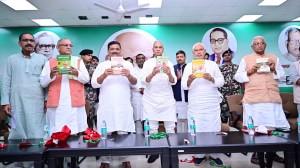Click here to join Express Pune WhatsApp channel and get a curated list of our stories
Pune’s Diwali market under GST 2.0: a season of stability
Prices for gold remain high but demand is steady, as customers continue their traditional purchases regardless of rates. Sweets and namkeen prices have decreased by 7 to 8 per cent, though overall demand remains strong.
 Gold jewellery sales shine bright, untouched by new tax norms. (Express Photo)
Gold jewellery sales shine bright, untouched by new tax norms. (Express Photo)Written by Ruta Patil
Pune’s festive economy has entered the Diwali season with unusual calm. The introduction of GST 2.0 earlier this year, expected to shake up trade and pricing structures, has instead left the markets largely untouched.
Across sectors, from gold and sweets to clothing and decoration, the sentiment is the same with steady prices and consistent demand-the difference here being that the annual rise in prices (barring gold, of course!) is missing, leading to an intrinsic relief for buyers and buoying spirits.
Gold: High rate, stable demand
At Ranka Jewellers on Laxmi Road, business continues at a familiar pace.
“The GST rates don’t impact gold as it comes under a separate category of 3 per cent. It’s Diwali season, people are coming to buy gold – no matter the rate, people do not miss the muhurta,” says Fatehchand Ranka, managing director, Ranka Jewellers.
Despite higher rates, footfall remains strong. “There has been a 75 per cent increase in gold prices as compared to last year, but customers are still coming in; those who want to buy gold will buy it,” he adds.
Customers agree. “Every year, I buy a small coin or chain for Dhanteras. It’s not about prices,” says Anita Parale, a homemaker. “Even if gold rates fluctuate, it’s an emotion.”
Sweets and faral-namkeen down by 8 per cent, response good
At Chitale Bandhu, business remains the same. “There is no change as such; the price of dry fruits hasn’t decreased as it was supposed to, but the GST on them has become uniform, and that’s great. Our packed namkeen rates have decreased by 7 to 8 per cent, but the overall response is good,” says Kedar Chitale, partner, Chitale Bandhu.
 Decorative lanterns and diyas fill market shelves, business steady, sentiment balanced this Diwali. (Express Photo)
Decorative lanterns and diyas fill market shelves, business steady, sentiment balanced this Diwali. (Express Photo)
He adds, “There’s uniform GST on almost all our food items, so pricing has become transparent and hassle-free. I think the people who didn’t pay GST will start paying it because of the reduced slabs — it’s a positive shift and a welcome move.”
The faral industry also remains stable. “For food products, there is not much change in product manufacturing; packaging and distribution are the same. There is a partial change due to GST, but it doesn’t affect manufacturers much,” says Sameer Bhalerao, owner of Royal Indian Foods, Sadashiv Peth.
Clothing: competition is from online, not GST
On FC Road, where tradition meets trend, stores report footfalls comparable to last year. “We had to change our entire inventory and did what we could to make things easier for us. Diwali season, just like every year, is going well, there is no significant change as such due to GST,” says Laxman Kadam, director of the brand ‘Mi ani Tu’.
 Laxmi Road sees its familiar festive rush, neither soaring highs nor slowdowns, just Pune’s usual Diwali rhythm. (Express Photo)
Laxmi Road sees its familiar festive rush, neither soaring highs nor slowdowns, just Pune’s usual Diwali rhythm. (Express Photo)
Shoppers are also practical rather than price-driven. “I bought two kurtas instead of four this year,” says Jui Deshpande, a media student. “Not because prices changed, just being practical.”
Smaller retailers say their competition is not tax reform but e-commerce. “GST has not affected us as such; the competition from online stores remains our biggest challenge, not GST,” says Ashok Mergu, owner of Ambika Collection, Laxmi Road.
Diyas and fireworks: change driven by social sentiments, not tax
In Kumbharwada, the lanes shimmer with the glow of clay diyas and handmade lanterns. For small vendors here, GST feels distant.
“We don’t come under GST,” says Aarti Kumbhar. “Still, sales are good, everyone wants diyas and murtis for Diwali. GST or not, people’s faith doesn’t change, and we are neither under profit nor loss.”
Fireworks sellers mirror the sentiment. “The GST rate remains the same; there’s been no real policy shift. What’s changing is demand; families prefer soundless, eco-friendly crackers. That’s a social change, not a tax
effect,” says Ganesh Sahadev, owner of Shree Swami Samarth Fataka Market, Balewadi.
“Every year prices go up a little, but this year nothing unusual. GST or no GST, kids will always want fireworks”, says Yogita Desai, a home tutor.
Even regular buyers agree that prices feel familiar. “I got everything from clothes, decoration, diyas, to even faral and sweets. Last year also I spent around this much, so I haven’t noticed any impact as such,” says Satish Suryawanshi, an IT professional.
“Murtis, diyas, lanterns, clothes, I got it all, prices are the same, haven’t observed any changes at all,” adds Anuradha Shelke, a homemaker.
Experts say the system is working
Economics experts say the neutrality of this Diwali’s market reflects a deliberate plan.
“GST 2.0 isn’t about changing tax rates, it’s about achieving balance,” says Reshma Sawant, economics professor at Modern College.
“It was a strategic move that stabilised the economy during Diwali. The policy ensured there were no tensions at the micro-level during this peak period. With so many tariffs already in place, slowing down business was not an option. Consumption patterns, especially abroad, are rising, and this season drives both consumption and tourism.”
“The idea behind GST 2.0 was to neutralise the impact of tariffs. That’s why people aren’t sensing any major changes because the system is working as intended. Stability in prices is actually a positive outcome. Prices staying the same means the market has successfully been kept neutral, which was the whole objective,” adds Sawant.
Ruta Patil is an intern with The Indian Express.
Click here to join Express Pune WhatsApp channel and get a curated list of our stories







